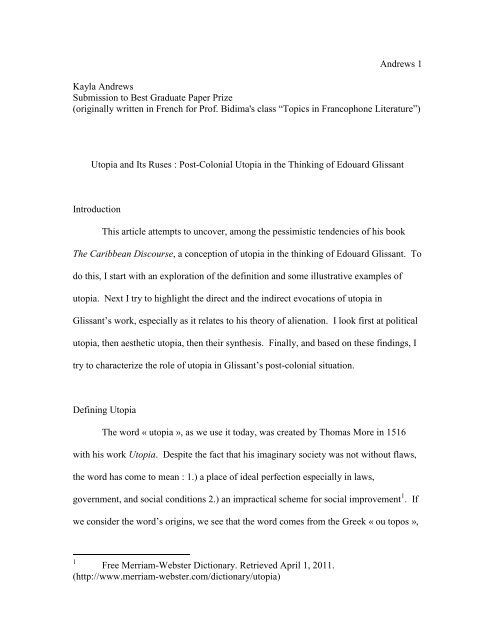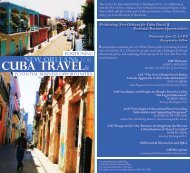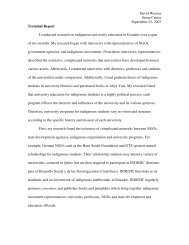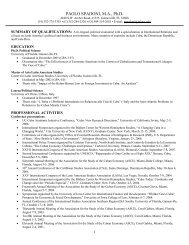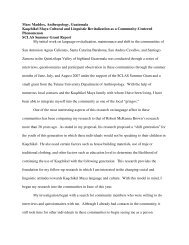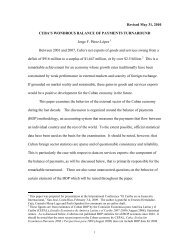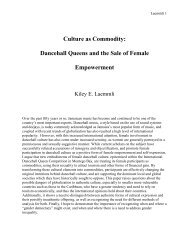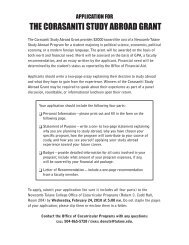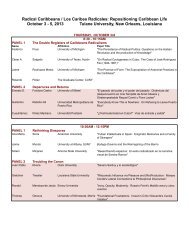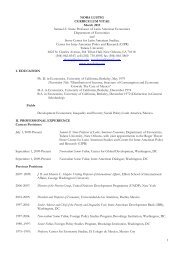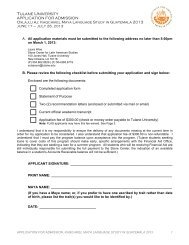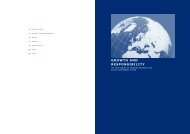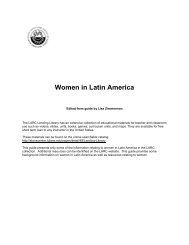Andrews 1 Kayla Andrews Submission to Best Graduate Paper Prize ...
Andrews 1 Kayla Andrews Submission to Best Graduate Paper Prize ...
Andrews 1 Kayla Andrews Submission to Best Graduate Paper Prize ...
You also want an ePaper? Increase the reach of your titles
YUMPU automatically turns print PDFs into web optimized ePapers that Google loves.
<strong>Andrews</strong> 3from the Surrealists, conceives of a vision of u<strong>to</strong>pia, not as an alternative that will bepermanently relegated <strong>to</strong> exist « no place », but rather as a solution which does not yethave a place. In this way, the « no place » of the word’s origin becomes a challenge,changeable. For Marcuse, u<strong>to</strong>pia is the possible.Examples of U<strong>to</strong>pia and Counter-Examples of Dys<strong>to</strong>piaThe most celebrated examples of u<strong>to</strong>pian literature describe an ideal society.They construct a vision of the societal good and try <strong>to</strong> determine the steps necessary <strong>to</strong>attain it. For Pla<strong>to</strong>, and for More who was inspired by him, the ideal republic will haveonly what it needs <strong>to</strong> ensure the happiness of its citizens and nothing more. The societalgood is thus well-being and self-sufficiency 5 . Next Pla<strong>to</strong> and More elaborate on the stepsnecessary <strong>to</strong> achieve this, which includes placing an inherent value on work, especiallyagricultural work ; scrupulously regulating who does what kind of work for how long ;and abandoning private property <strong>to</strong> achieve absolute equality between citizens 6 . Comtealso figures in this tradition of articulating the societal good, then designing a path <strong>to</strong>achieve it. He wants a society in which every exchange, every action, is motivated byaltruism. He thus develops a complex system of integral roles : the scientist-priests whomake decisions ; the capitalist-knights who put them in<strong>to</strong> action ; the women whose job is<strong>to</strong> teach the philosophy of altruism <strong>to</strong> the children. The point of so rudimentarilysummarizing the u<strong>to</strong>pias of Pla<strong>to</strong>, More, and Comte is <strong>to</strong> understand the tradition ofquestions ? ». Ibid., p. 26.5Glissant, Le discours antillais (Paris: Gallimard, 1997), p. 21.6John C. Olin, ed., Interpreting Thomas More’s U<strong>to</strong>pia (New York: FordhamUniversity Press, 1989), p. 19.
<strong>Andrews</strong> 4u<strong>to</strong>pian literature, which is the following : <strong>to</strong> describe, from grand principle down <strong>to</strong>small detail, an ideal society, thus <strong>to</strong> provide the readers with an alternative <strong>to</strong> that whichcurrently has a place in the existing society.The opposite of u<strong>to</strong>pia, called dys<strong>to</strong>pia, is a negative vision of a sordid, terriblesociety. This vision also engages the imagination, but <strong>to</strong> conceive of the worst ofpossibilities. Dys<strong>to</strong>pic literature, like Huxley's Brave New World or Orwell's 1984, oftendescribes a futurist situation, with a repressive and <strong>to</strong>talitarian government, whichterrorizes its citizens under the guise of u<strong>to</strong>pian ideals. Often conformity is pushed <strong>to</strong>extremes, or technology plays a tyrannical role, as in Brave New World, where thescientific engineering of embryos produces a genetically uniform population. Beneaththe terror and the sordid nature of these societies, there lies an implicit warning. If u<strong>to</strong>piacontains hope for a better world, dys<strong>to</strong>pia contains by definition a warning against whatcould result from our current principles and practices. If we continue like this, thedys<strong>to</strong>pic narrative suggests, we could end up like the society in the s<strong>to</strong>ry. Passing by twodifferent sides of the question, the role of both u<strong>to</strong>pia and dys<strong>to</strong>pia is <strong>to</strong> comment on ourcurrent society, and <strong>to</strong> engage the imagination in order <strong>to</strong> explore the shadowy depths ofthe possible.Glissant : Antillean AlienationIn his Caribbean Discourse, Glissant paints a pessimistic portrait of the Antilleanreality as he sees it. Because Martinicans import everything and produce nothing,because the « mimetic impulse » drives them <strong>to</strong> valorize everything that is French (the
<strong>Andrews</strong> 5language, the food, the values, the way of thinking about his<strong>to</strong>ry) and <strong>to</strong> forget everythingthat is specifically theirs, because the government cultivates a class of opportunisticfunctionaries who support metropole France's domination, and for still other reasons thatGlissant enumerates, Martinique is condemned <strong>to</strong> live in « la misère morale et mentale » 7 .Martinican society is alienated from itself and « menacé de dilution » 8 . Glissant explainsthis menace : « Il faut supposer que la colonisation française en Martinique risque bientôtde parvenir au « state suprême » de <strong>to</strong>ute colonisation, qui est de dépersonnalisercomplètement une communauté, de l’« absorber » dans un corps extérieur » 9 . Here wesee the explicit warning, in the same spirit as the implicit warnings of dys<strong>to</strong>pic literature,which denounces the present society in which the author lives.Glissant fills most of his pages with a pessimistic and critical vision of Martinicanreality. But among all this pessimism, and precisely through the presence of this dys<strong>to</strong>picwarning, Glissant leaves us traces, however vague, of his conception of post-colonialu<strong>to</strong>pia.Post-Colonial U<strong>to</strong>pia : The Political DimensionGlissant, without a doubt, puts more energy in<strong>to</strong> condemning reality as he sees itthan he does in<strong>to</strong> the creation of a u<strong>to</strong>pian vision. When he writes of a « projet national »[a national project], however, we can start <strong>to</strong> see traces of his political u<strong>to</strong>pia. Glissant7“moral and mental misery ». Glissant, Le discours antillais (Paris: Gallimard,1997), p. 190.8“menaced with dilution ». Ibid., p. 106.9“One must suppose that the French colonization in Martinique risks <strong>to</strong> soonachieve the « ultimate stage » of any colonization, which is <strong>to</strong> completely depersonalize acommunity, <strong>to</strong> « absorb » it in<strong>to</strong> an exterior body. » Ibid., p. 188-189.
<strong>Andrews</strong> 6writes that the national project is « rendu impératif par les insuffisances des solutions »proposed by the complacent bourgeoisie 10 . Glissant assumes that he is unquestionablynot a part of this group, and that he can give us real solutions. The national project has asits objectives : <strong>to</strong> « définir le statut original de ce pays, trouver des rélations résolu<strong>to</strong>iresentre ces « impossibles », ouvrir les solutions à l’en<strong>to</strong>ur caraïbe, mettre en ouvre unestratégie à la fois radicale et patiente, continue et soudaine » 11 . Before looking atGlissant's propositions for achieving these objectives, it is worth doing a close reading oftheir articulation.With the phrase « <strong>to</strong> define the original status of this land, » we see theimportance of collective identity in all its variations. By « original status, » we couldunderstand the legal status of Martinique, which, as a department of France (like a statein the U.S.), theoretically possesses all the same political rights as the departments in themetropole, but which as a former colony and Caribbean island, in practice has afundamentally different status than the departments on the other side of the Atlantic. Butbeyond the idea of legal status, « the original status of this land » could also refer <strong>to</strong> amore subjective identity : the personal conception of the Self. Glissant often repeats theidea that Martinique is wrong <strong>to</strong> search for herself either in Africa (which he calls the « lapulsion de re<strong>to</strong>ur » [the impulse <strong>to</strong> return]) or in France (« la pulsion mimétique » [themimetic impulse]). Glissant insists that the true Martinican identity cannot be found10« rendered imperative by the inadequacy of the solutions. » Ibid., p. 124.11“define the original status of this land, find solutions <strong>to</strong> the impossible questions,extend these solutions <strong>to</strong> surrounding Caribbean societies, put in<strong>to</strong> action a strategy a<strong>to</strong>nce radical and patient, continuous and sudden. » Ibid., p. 125.
<strong>Andrews</strong> 7outside the island, but only through « l’enracinement déterminé dans la terre nouvelle » 12 .Martinique has an original status of identity, different from France and different fromAfrica, and <strong>to</strong> achieve a political u<strong>to</strong>pia, it is essential that Martinicans recognize this.With the desire <strong>to</strong> « extend these solutions <strong>to</strong> surrounding Caribbean societies, »Glissant evokes a desire for solidarity among Caribbean islands. Glissant writes at lengthon this theme, lamenting the fragmentation of the Caribbean. « L’assimilation parachèvela balkanisation, 13 » he writes, explaining that after the law making Martinique andGuadeloupe in<strong>to</strong> French departments, the island societies « sont ainsi conduits à se nieren tant que collectivité, 14 » as part of the illusory path <strong>to</strong>ward equality with the French.Glissant writes : « L’idée de l’unité antillaise est une reconquête culturelle. Elle nousréinstalle dans la vérité de notre être, elle milite pour notre émancipation. » 15 . Glissant'spolitical u<strong>to</strong>pia clearly involves an active solidarity among Caribbean societies.Glissant demands a « patient » strategy. He explains that patience, in order not <strong>to</strong>be procrastination, requires that the fundamental solutions be proposed from thebeginning. Here he provides yet another list. The first enumeration, cited above,explained the general objectives of the national project ; the list that follows will providethe solutions in more detail :l’indépendance mais sans le leadorat d’une « classe » moyenne ; lecontrôle populaire, mais débarrassé du macoutisme populiste qui en est le fauxsemblant; les formes socialistes du pouvoir, une fois élucidé les problèmes del’organisation de la production et leur harmonisation avec les techniques12“determinedly putting down roots in the new earth. » Ibid., p. 182.13“Assimilation accomplishes balkanization ». Ibid., p. 26.14« ...have thus been driven <strong>to</strong> deny their own existence as a collectivity » Ibid.15“The idea of Caribbean unity is a question of cultural reconquering. It puts usback in<strong>to</strong> the truth of our being, it campaigns for our emancipation. » Ibid.
<strong>Andrews</strong> 8réadaptées de survie. 16We see here the vague and negative character of the political u<strong>to</strong>pia of Glissant. With theterms « independence » and « popular control », for example, Glissant make reference <strong>to</strong>an ideal, only <strong>to</strong> continue it in negative terms : this, but not that ; that, but without this.The vast majority of his attention is consecrated <strong>to</strong> a negative vision of the currentsociety, and even his proposed solutions sound a bit like condemnations.In general, therefore, the real key <strong>to</strong> finding a political u<strong>to</strong>pia in Glissant'sthinking seems <strong>to</strong> exist outside of what he proposes explicitly, and <strong>to</strong> be found insteadhidden and implied amongst his criticisms. He laments the absence of real jobs inMartinique, the « néantisation economique » 17 , that replaces local agricultural andartisanal trades with imported products, au<strong>to</strong>nomy with dependence. He also laments theeffect that this has on Martinique's language : since Martinican Creole has « cessé d’êtreune langue de fonction, de métier, ou de production » thus the language « se banalise »[grows banal]. 18 . Martinique does not valorize its own specificity and succumbs <strong>to</strong>French assimilation. We can only conclude, therefore, that a post-colonial u<strong>to</strong>pia forGlissant would be <strong>to</strong> recreate real production and jobs on the island, thus <strong>to</strong> abandonimports for local products. (As in the ideal republics of Pla<strong>to</strong>, More, and Comte, workplays a central role in the political vision of Glissant.) It is by doing all this thatMartinique can recover from the traumas of economic, linguistic, and juridical alienation16“...independence but without the leadership of a « middle class » ; popularcontrol, but without the popularist macoutism which is a deceptive look-a-like ; socialistforms of power, the elucidation of the organizational problems of production, and theirharmonization with re-adapted techniques of survival. » Ibid., p. 125.17“economic annihilation. » Ibid., p. 325.18“ceased <strong>to</strong> be a language of function, of trade, or of production » Ibid., p. 298.
<strong>Andrews</strong> 9from which she suffers.We can notice here a specific problem in the idea of post-colonial u<strong>to</strong>pia.Glissant remarks on this problem in a footnote, when he writes : « Produire ou créer« contre » un système est certainement une pratique limitative et parfois frustrante » 19 .We can see this idea in the context of creating a post-colonial u<strong>to</strong>pia. All conceptions ofu<strong>to</strong>pia are in part a protest against the present society, but in the context of colonizationand its legacy, u<strong>to</strong>pia becomes a conception specifically situated against the traumaticcolonial his<strong>to</strong>ry, and against the global system that gave birth <strong>to</strong> colonization. The fact <strong>to</strong>create a u<strong>to</strong>pia always in opposition <strong>to</strong> all that makes the exercise limited and frustrating.A u<strong>to</strong>pia thus conceived must have, at its base, ideals such as the independence of theterri<strong>to</strong>ry, a rudimentary valorization of its culture, its language, and its products. That is<strong>to</strong> say, a u<strong>to</strong>pia conceived without the limits of being in opposition <strong>to</strong> a colonial pastwould probably have these things as givens, as something obvious. But the post-colonialthinker is constrained <strong>to</strong> fight simply <strong>to</strong> achieve these basics, which are, as we see in thepessimism of Glissant, far from being won.Post-Colonial U<strong>to</strong>pia : The Aesthetic DimensionWith his call for « determinedly putting down roots in the new earth », with hisimperative <strong>to</strong> reject both the impulse <strong>to</strong> « return » <strong>to</strong> Africa and the impulse <strong>to</strong> mimicFrance, Glissant engenders an artistic and philosophical movement against theassimilationist instincts of Frenchification and against the essentializing aspects of19« To produce or create « against » a system is certainly a limited and sometimesfrustrating practice. » Ibid., p. 174.
<strong>Andrews</strong> 10Négritude. He wants <strong>to</strong> concentrate on what is specific <strong>to</strong> the Caribbean, and in doing so,he notes the process of creolization in the Americas, by which heterogenous elementsconstantly mix and create unpredictable new forms. In the Caribbean, this process beginsmainly with the African slave trade starting in the sixteenth century, and it includes alsothe indentured servitude of Hindus in the nineteenth century. Creole languages, jazzmusic, even the Mardi Gras Indians of New Orleans, are all cited by Glissant as examplescreolization 20 . Glissant considers the his<strong>to</strong>ry of creolization, especially in the Caribbean,and draws the conclusion that it is incorrect <strong>to</strong> accept traditional Western thought, whichsees entities as having a stable and absolute identity coming from a single primordialroot. Instead he conceives of what he calls a « poétique de Rélation » [poetic of Relation]or a « poétique du divers » [poetic of the diverse], which valorizes the complexity of arhizomatic identity, its perpetual change, and its always unpredictable results.We can clearly see the importance of his<strong>to</strong>ry in any discussion of creolization.Glissant writes that the author's job is <strong>to</strong> « fouiller » his<strong>to</strong>ry. 21 . Glissant identifieshis<strong>to</strong>rical consciousness as something which « permet [à la collectivité] de dépasser lesrejets inconscients de la structuration imposée, précisément en l’au<strong>to</strong>risant à réfléchirconcrètement sur la nécessite des structures et à décider d’en susciter de nouvelles » 22 .Thus the « poetics of Relation » includes a temporal engagement, which connects it a<strong>to</strong>nce <strong>to</strong> the problems of the past and <strong>to</strong> the u<strong>to</strong>pian projects of the future.20Glissant, Introduction à une poetique du divers (Paris: Gallimard, 1995), p. 19.21“Fouiller” can mean <strong>to</strong> dig, <strong>to</strong> sift through, <strong>to</strong> search. Glissant, Le discoursantillais (Paris: Gallimard, 1997), p. 226.22« ...allows [the collectivity] <strong>to</strong> surpass its unconscious rejection of the imposedstructure, precisely by authorizing it <strong>to</strong> reflect on the necessity of structures, and <strong>to</strong> decide<strong>to</strong> create new ones. » Ibid., p. 156.
<strong>Andrews</strong> 11Patrick Chamoiseau, Jean Barnabe, and Raphael Confiant, among others, werevery inspired by Glissant's « poetics of Relation » and contributed <strong>to</strong> birth of the artisticmovement known as « la créolité. » In their famous, Eloge de la Créolité, they proclaimthat la créolité is « une annihilation de la fausse universalité, du monolinguisme et de lapureté » 23 , which are all key negative concepts in Glissant's discourse. It is important <strong>to</strong>note, however, that there are some differences between the créolité of these writers andthe poetic u<strong>to</strong>pia of Glissant. Glissant warned them that what they called « la créolité »risked <strong>to</strong> fashion itself in<strong>to</strong> yet another Western-style essentialism, something stable andfixed. Glissant, by prefering <strong>to</strong> use the term créolisation, instead of créolité, insists onthe concept's perpetual process of becoming. Also, Glissant admitted in an interview thathe found the creolization of Chamoiseau and Confiant <strong>to</strong>o « proclamée » [proclaimed],not subtle enough for his taste. 24Despite these differences, Chamoiseau, Confiant, and Barnabé are neverthelessintegral in the application and exploration of the ideals of Glissant. The language inChamoiseau's novels, for example, plays with French in a lively and irreverent manner.His characters are a rainbow of coulies (local word for Martinicans with Asian Indianheritage), syriens (with Middle Eastern heritage), chabins (local word for light-skinnedblacks), nègs (for dark-skinned blacks), and mulat<strong>to</strong>s. His his<strong>to</strong>rical engagement is alsovery active, as in the chronicle of the life of djobbeurs (men with wheel-barrows whomade a living doing odd jobs in the market) in Fort-de-France (La chronique des sept23« an annihilation of false universalities, of monolingualism, and of purity. »Chamoiseau et al. “Eloge de la Créolité.” Retrieved November 22, 2010(http://www.ieeff.org/141creolite.htm).24Glissant, Introduction à une poetique de divers (Paris: Gallimard, 1995), p. 54.
<strong>Andrews</strong> 12misères, 1986), or in the saga which follows one family from slavery, <strong>to</strong> marronnage inthe mountains, <strong>to</strong> the apocalyptic irruption of Mont Pelée in Saint-Pierre, <strong>to</strong> theurbanization of the present day (Texaco, 1992).The attempts of writers like Chamoiseau <strong>to</strong> explore questions of localcreolization and local his<strong>to</strong>ry has led certain literary critics <strong>to</strong> write about « nationalMartinican literature », citing Chamoiseau, Barnabe, and Confiant 25 . This designation of« national literature » is reminiscent of Glissant's political u<strong>to</strong>pia, which he calls « thenational project ». The similarity of these two terms denounces the illusion of a cleardivision between the political and poetic domains, because the two are alwaysoverlapping. In fact, Glissant and others believe that the blossoming of their poeticu<strong>to</strong>pia will guide and encourage the birth of their political u<strong>to</strong>pia (which <strong>to</strong>day remains ingestation, not a « no place » but a « not yet »). The moment that the surrealists, cited byMarcuse, ask if the values of their artistic movement cannot also be applied <strong>to</strong> « thefundamental questions of life », reveals the fact that all aesthetic u<strong>to</strong>pias are alsoconcerned by political questions, and vice versa. Patrick Chamoiseau, in an interviewabout neo-liberal domination, said : « Pour s’opposer à cette nouvelle domination, nousdevons créer ce que j’appelle le nouveau guerrier. En produisant un nouvel imaginaire,on peut d’ici 10 ans créer de nouveaux militants, de nouveaux économistes (...) Mon rôleest de fournir à l’imaginaire politique des amplifications » 26 . This vigorous commentary25See, for example: Luciano C. Picanço, Vers un concept de literature nationalemartiniquaise: evolution de la literature martiniquaise au XXeme siecle (New York: P.Lang, 2000).26« To fight against this new domination, we must create what I call the newwarrior. By producing a new imaginary, we can in ten years from now create new
<strong>Andrews</strong> 13is in agreement with Glissant's ideas on the active role of literature in arming thecollectivity with a repossession of his<strong>to</strong>ry, and by encouraging the conception of newstructures.Poetic u<strong>to</strong>pia, like political u<strong>to</strong>pia, perhaps ultimately comes back <strong>to</strong> thecomprehensive problem of work. It is the absence of work, of production, of realfunction in Martinique which empties Martinicans of self-esteem and which pushes them<strong>to</strong>ward the dilution of Frenchification, <strong>to</strong>ward the uncritical adoption of Western ways ofthinking. Glissant often writes that the time of plantations was the last instance ofsignificant production in Martinique. Creole culture blossomed during this period,including dances, song, s<strong>to</strong>ries, proverbs. Glissant clearly explains that : « Au fur et àmesure que le system des plantations se décompose, la culture populaire se délite » 27 .This is because « le système des Plantations ne donne pas suite à un nouveau système deproduction mais s’effrite et se dilue dans une non-production » 28 . Since the end ofslavery, Martinique has largely s<strong>to</strong>pped producing, exporting, or consuming locally madeproducts. A true Caribbean poetic u<strong>to</strong>pia, which plunges in<strong>to</strong> the complexities of his<strong>to</strong>ryand finds there implications for the future, which valorizes the rhizomatic roots of theAmericas and the constantly changing relationship among these, can only emerge withstrength in a political and economic situation of self-sufficiency, and thus, necessarily, ofactivists, new economists. (…) My role is <strong>to</strong> provide <strong>to</strong> the political imaginary someamplifications. » Patrick Chamoiseau, “La guerre doit etre mene sur le terrain del’imaginaire.” Disponsible en ligne:http://www.lesperipheriques.org/article.php3?id_article=353.27“As the plantation system fell apart, popular culture crumbled. » Glissant, Lediscours antillais (Paris: Gallimard, 1997), p. 311.28« the plantation system was not followed by a new system of production, butdissolves and dilutes itself in<strong>to</strong> a state of non-production. » Ibid., p. 312.
<strong>Andrews</strong> 14production. The political u<strong>to</strong>pias of Pla<strong>to</strong> and More, which insist on the importance ofwork, reappear in the poetic concerns of Glissant, demonstrating the inextricable overlapof the poetic and political domains.ConclusionThe question of u<strong>to</strong>pia is critical in the quest <strong>to</strong> understand the post-colonialsituation of Martinique and the Caribbean in general. In the very vagueness of Glissant's« national project », we see the difficulties of conceiving an ideal in the face of politicalrealities such as dependance, neo-liberalism, and consumerism. Despite thesedifficulties, we see in Glissant the courage <strong>to</strong> hope for a u<strong>to</strong>pia, which would includewidespread Caribbean unity, a repossession of his<strong>to</strong>ry and of Martinican uniqueness, andeconomic self-sufficiency. The artistic side of this same u<strong>to</strong>pia, which manifests itself inthe « poetics of Relation » and in depictions of his<strong>to</strong>ry and of creolization, constitutes anindirect path, an imaginative path, <strong>to</strong>ward achieving these same objectives. Politicalhopes and artistic explorations are thus two different ruses by which Glissant tries <strong>to</strong>encourage the birth of new structures, <strong>to</strong> find a place for the « no place » that is u<strong>to</strong>pia.


